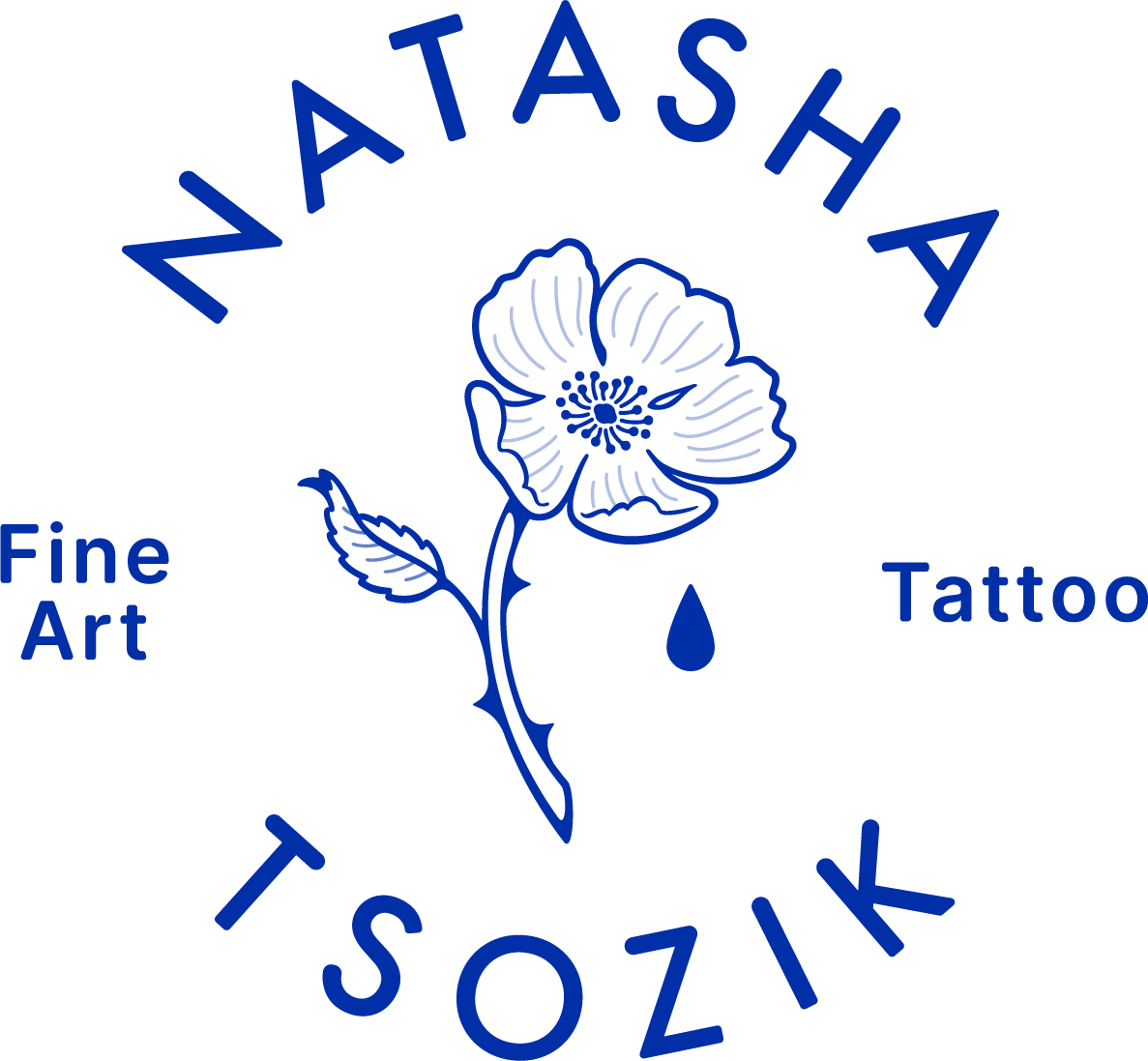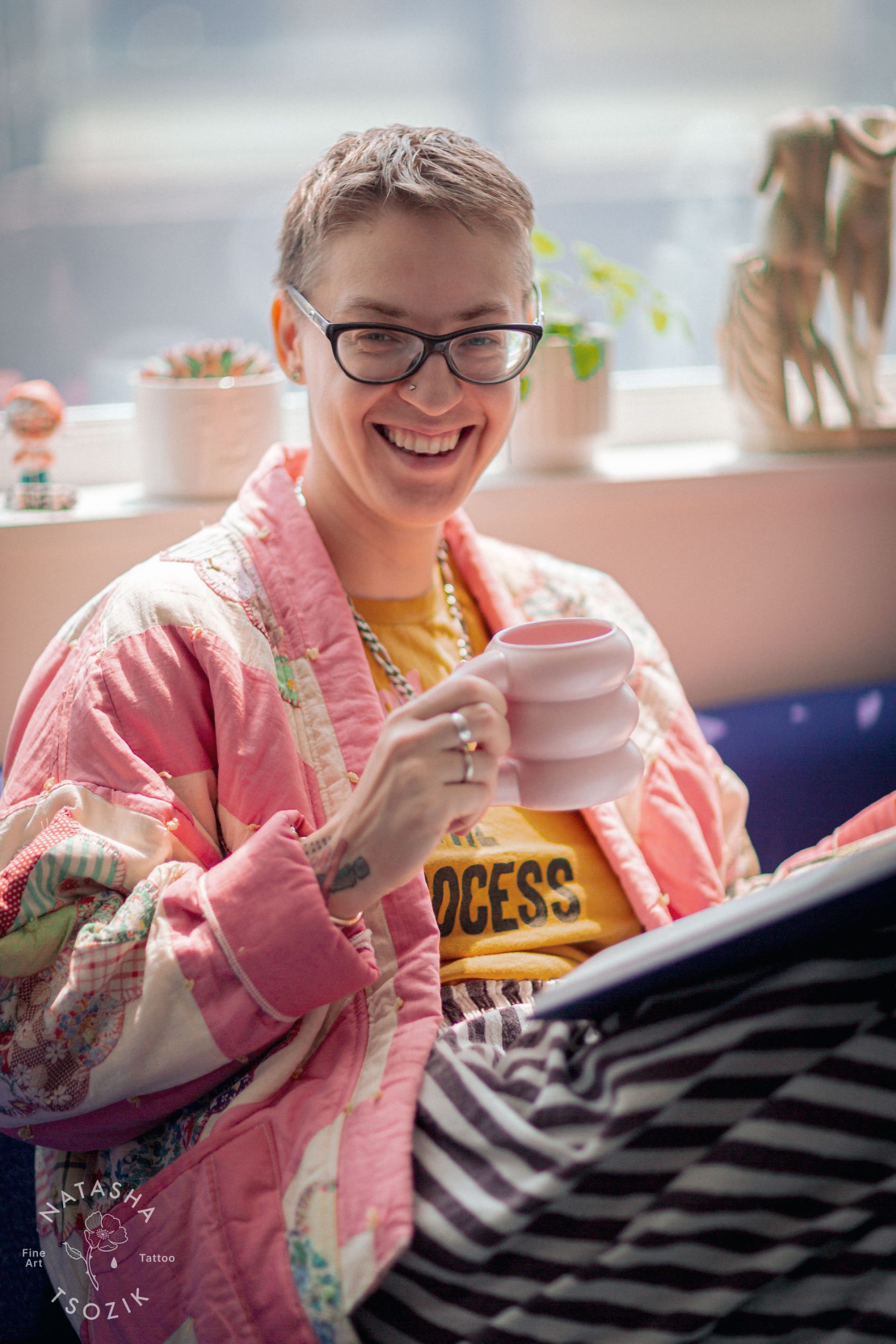Exploring Vegan and Eco-Friendly Practices in the Tattoo Industry
I’ve always been bothered by how much waste our industry generates. So eco-tattooing emerges as a beacon of sustainable artistry. Embracing eco-friendly practices and vegan tattooing, these tattoos celebrate not just creativity, but also environmental consciousness. Let’s explore how a tattoo world can become a better environment.
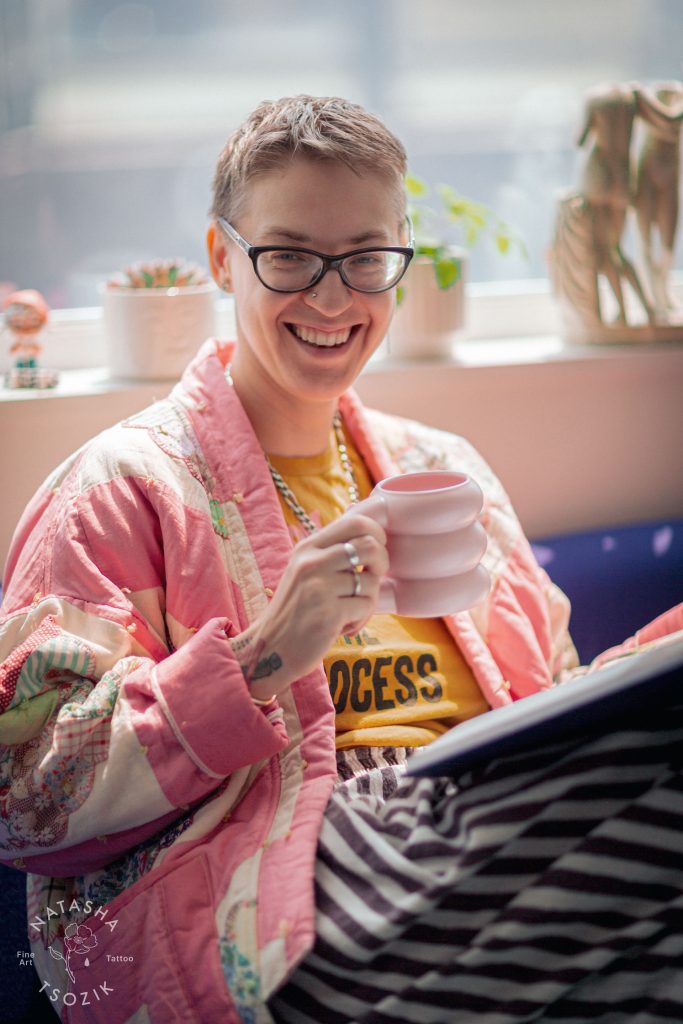
Natasha Tsozik—vegan tattoo artist, based in San Francisco, Bay Area.
Nature has always been my primary source of inspiration, especially for crafting floral tattoos. I’ve been vegan for more than a decade, thus implementing these ideas in my work too is a genuine goal. Eco-tattooing is a way of life.
Striking a balance between safety and environmentally friendly practices poses a significant challenge. Throughout the decades, the stress on ensuring maximum safety for both clients and tattoo artists has often led the tattoo industry to rely on less sustainable methods. Currently, not all tattoo supplies can be easily replaced by green alternatives, mainly because many techniques originate from the medical field with strict regulations. Nevertheless, thanks to a variety of studies, numerous aspects of our approach can already be adjusted in favor of ecological considerations.
The fantastic news is that more tattoo artists today are considering the planet when establishing their practices. I began this journey before it gained widespread recognition, even when there weren't a lot of eco-friendly tattoo supplies available. I had to improvise 🙂 So, I'm really happy that these new supply companies are becoming more recognizable and accessible. We're realizing that clean and safe setups can also be eco-friendly.
What is eco-friendly tattooing?
"Eco-tattooing" refers to a conscientious approach within the tattooing industry aimed at doing the least possible damage to the environment. This practice entails adopting eco-conscious products and processes to reduce waste and reliance on non-renewable resources. Eco-tattooing embraces vegan principles by offering cruelty-free products and services.
Key features of vegan-tattooing.
Minimizing the environmental impact:
The primary goal of eco-tattooing is to reduce the single-use plastics and harmful chemicals associated with the tattooing process. This involves a shift towards using tattoo supplies that are certified as compostable or biodegradable.
Waste Minimization:
Eco-tattooing results in less waste production compared to traditional methods. Traditional plastic tattoo supplies frequently find their way into landfills or incineration facilities, presenting long-term environmental risks. In contrast, compostable products break down naturally, returning to the earth without leaving harmful residues.
Energy Efficiency:
Unlike traditional plastics, the manufacturing of eco-friendly tattoo supplies requires significantly less energy. This energy-saving aspect translates into reduced consumption of fossil fuels and lower greenhouse gas emissions, contributing to a more sustainable industry.
Vegan-Friendly Service:
Eco-tattooing follows vegan principles by using cruelty-free products and services, including vegan tattoo ink and plant- and water-based tattoo care. Ensuring no harm to animals within the tattooing process, appealing to both vegans and those looking for sustainable options.
Personal Experience: Vegan For Life.
At Natasha Tsozik Fine Art Tattoo Studio you’ll get an eco-friendly approach: from vegan tattoo ink and biodegradable tattoo supplies to even vegan snacks in the lounge area.
My goal is to set up the process in such a way as to utilize as many compostable shop supplies as possible. I aim for all tattoo supplies, except for metal parts like needles and blades in razors, to be compostable and environmentally friendly. For example, I have ensured that the liquid solidifying powder I use (which tattooers use to properly dispose of contaminated liquids. In ink caps for example) is biodegradable.
Yet, not all of these products are nature-friendly. I had to make sure that the paper tape that I use is plastic-free, for example. ‘Cause the most popular are not.
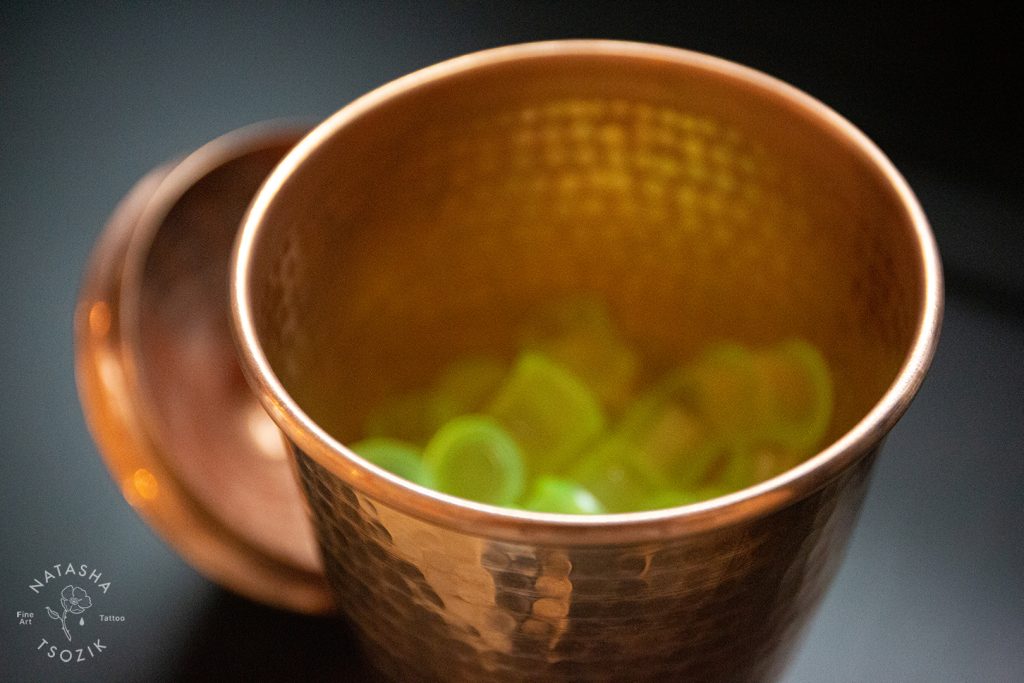
My go-to consumables and barrier protection products are from Good Judy and a few others that I occasionally seek out. I am particularly drawn to the company's eco-conscious approach to living. On the Good Judy platform, you'll find a wealth of valuable information about bioplastics and biodegradable products. Each product details proper disposal methods and highlights its advantages.
You can already transition to using more eco-conscious products like thick eco towels (you use much less of them than traditional ones), biodegradable gloves, bamboo tongue depressors instead of wooden, razors with compostable handles, compostable bottle bags, ink caps, clip cord sleeves, barrier film, trash bags, compostable masks and so on.
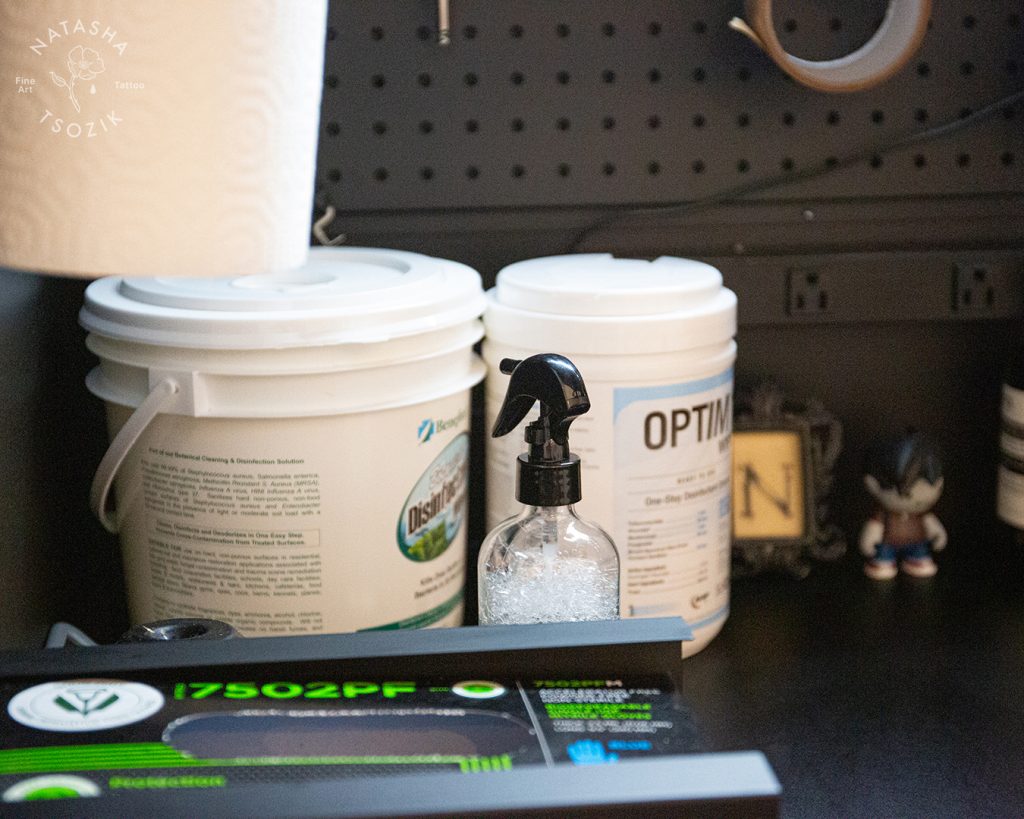
As tattoo artists, we must think about cross-contamination and adhere to strict cleaning routines. It doesn’t stop me from applying greener yet still effective products. For example, for surface cleaning, I use Benefect and Optim 1 since they’re eco-friendly and non-carcinogenic.
In my private tattoo studio, I exclusively use vegan ink. Which is made from plant-based or synthetic materials, ensuring no harm to animals within my practice. Fortunately, it’s pretty common for inks nowadays. My top choices for tattoo ink are Dynamic, World Famous, Intenze, and Fusion.
Selecting tattoo care products without petroleum-based ingredients is highly recommended, and many tattoo artists have already embraced this approach. Typically, opting for plant- and water-based tattoo care is considered the healthiest way to nurture your fresh tattoo.
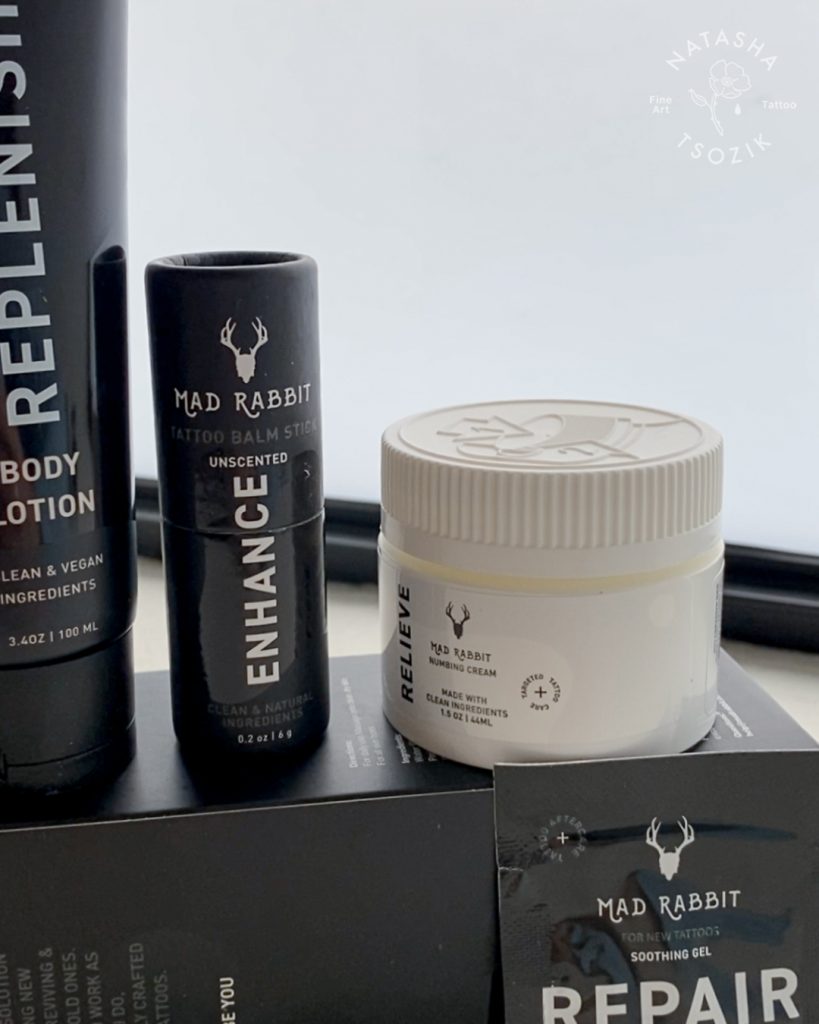
Recently, I've been using Mad Rabbit products and I'm impressed by their serious approach to manufacturing. Even the packaging is designed to be as eco-friendly as possible. I now carry some of the vegan Mad Rabbit products I prefer at my store, including before and aftercare like a numbing cream and lotions.
Certainly, besides the traditional waste disposal methods in the tattoo industry, it will be necessary to integrate new practices into the routine, and in some cases, replace existing ones. Here are some resources you might find useful for understanding the difference between biodegradable and compostable materials, discovering new tips, and aligning yourself with eco-friendly practices.
obsidiantattoosupply.com—If you're in the US, here you can purchase ink caps I like by Green House Tattoo Supply;
goodjudy.ca—More eco-friendly tattoo supplies;
Good Judy's blog–How to transition to using more eco-conscious products;
luckysupply.com—Discover the top reasons tattooers worldwide are going green;
Vegan Tattooing In Conclusion
In conclusion, eco-friendly tattooing is about minimizing environmental impact while promoting sustainability in the industry. Despite challenges, there's a growing awareness among tattoo artists towards eco-friendly alternatives like compostable supplies, vegan inks, and petroleum-free care products. This shift not only benefits the environment but also fosters a healthier future for tattooing. With continued dedication, the momentum towards eco-friendly practices in the industry will flourish.
